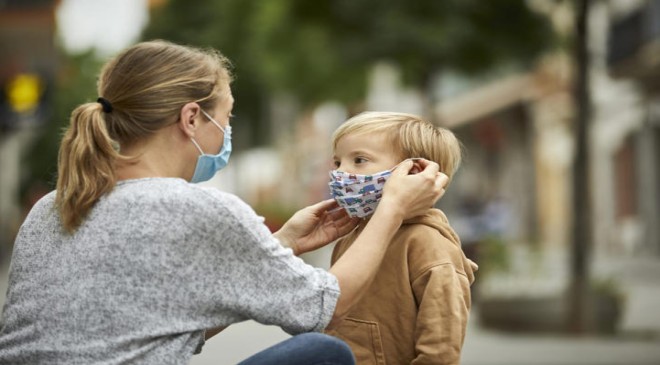
By now, you’ve probably heard about the Omicron strain of COVID-19, which has been dubbed a “variant of concern” by the World Health Organization (WHO). We still don’t know much about it, but preliminary evidence suggests it could be more transmissible than previous strains of the coronavirus. It might also evade protection from vaccines or past infections
Omicron (B.1.1.529) was initially detected in southern Africa in November 2021, but it’s been identified in at least 20 countries now. On December 1, it was officially found in America, according to the Centers for Disease Control and Prevention (CDC). The California-based patient recently returned from a trip to South Africa, and they’re experiencing mild symptoms. Minnesota also reported an Omicron case in someone who recently traveled to New York City.
The Omicron variant will inevitably start circulating across America soon, but experts say there’s no reason to panic. That’s because everyone aged 5 and up is eligible for COVID-19 vaccination, booster shots are approved for those 18 and older, and health officials understand best practices for warding off the virus (keep wearing those face masks!).
Still, with the holiday season in full swing, parents have plenty of questions: Where did the Omicron variant come from? What are the telltale symptoms? How will it affect children? Here’s everything you need to know about this new, more transmissible strain of COVID-19.
Where Did the Omicron Variant Come From?
Viruses tend to change as they spread throughout a community, and COVID-19 is no exception. “When a virus gets into the cells of a patient, it begins to make copies of itself,” explains Kristina Deeter, M.D., pediatric intensivist and specialty medical officer for pediatric critical care medicine at Pediatrix Medical Group. “There can be ‘mistakes’ in the RNA copies that it makes of itself, and these new mutated copies can then be spread to other people.”
The Omicron variant is particularly concerning because it has an “unusually high number of mutations”—more than 30 in total, according to The New York Times. These mutations affect the spike protein, which causes infection by penetrating host cells. Experts believe these changes could make the virus more transmissible and affect vaccine response, says Purvi Parikh, M.D., an allergist and immunologist with the Allergy and Asthma Network and co-investigator on the vaccine trials
Should I Be Concerned About the Omicron Variant?
Experts worry that Omicron will cause new waves of COVID-19 infection around the world—particularly in places with low vaccination rates. “Likely due to our recent history of having millions of additional cases of COVID-19 when it mutated to the current Delta strain, we are more concerned about any further mutations in SARS-CoV2 that may result in further infections globally,” says Dr. Deeter.
Experts are currently learning about this new COVID-19 variant, which partly explains why health organizations have been sounding the alarm. “Omicron has created concerns due to a large number of mutations it has when compared to the original Alpha strain, which may allow it to be even more contagious than previous strains,” explains Dr. Deeter.
Indeed, South Africa has seen more positive COVID-19 cases after detection of the Omicron variant, but epidemiologic studies are currently looking into the causes. It’s possible that other factors may be to blame for increased transmission, says WHO.
Preliminary evidence has also suggested an increased risk of reinfection with Omicron; that’s possibly because mutations to the spike protein help the virus evade antibodies.
We still don’t know if the current vaccines will protect against the Omicron strain, or whether symptoms are more severe. But “so far, most of the patients that have been infected with the Omicron strain have been younger and have only experienced mild symptoms,” says Dr. Deeter.
What Are the Symptoms of the Omicron Variant?
Though we’re still learning about the Omicron variant, preliminary evidence suggests it often causes mild illness, with slightly different symptoms from other coronavirus strains. According to Dr. Parikh, patients have been “reporting no loss of smell or taste and some scratchy throat, but many other classic symptoms remain the same.”
Dr. Angelique Coetzee, chair of the South African Medical Association, has treated patients with body aches and pains, mild coughs, and slight headaches. Her patients also didn’t experience a major drop in oxygen levels, and they recovered at home without complications, according to Reuters.
Dr. Coetzee also mentioned that Omicron patients appear to be younger, which correlates with preliminary evidence around the world. Indeed, the National Institute for Communicable Diseases has said that children under 2 years old account for 10 percent of hospital admissions in Tshwane, South Africa (an epicenter of the Omicron variant). It’s possible that the increase in pediatric hospitalizations is due to lower vaccination rates in children or their immature immune systems. Worried parents could also be taking their children to the hospital as a precautionary measure.
Do Vaccines Protect Against the Omicron Variant?
Health officials don’t yet understand how the Omicron variant reacts to COVID-19 vaccines. “Due to the structure of the new strain, there’s concern that the vaccine may not be as effective,” says Dr. Deeter. “We remain hopeful that the vaccine will continue to protect us against moderate to severe disease, but we may see more mild cases of COVID-19 in vaccinated individuals”—called breakthrough infections.
Also, as the virus continues to shift and mutate, our vaccination strategy might become less effective. “Our current vaccinations are directly focused on the spike protein architecture of the COVID-19 virus,” says Dr. Deeter. “If the structure of the virus begins to change, as the Omicron variant has, then the concern is that our vaccinations may not be as effective in protecting the vaccinated population.”
That said, vaccine manufacturers are confident they can tweak vaccines to better fight against the Omicron variant, if necessary, reports The New York Times.
Medical organizations and health professionals recommend everyone 5 and up get vaccinated. You should also receive the COVID-19 booster shot if you’re eligible. All available vaccines have been shown to protect against severe illness, hospitalization, and death from the currently circulating COVID-19 strains—including the Delta variant, which is still prevalent around the world.
Another reason to roll up your sleeve: Low levels of vaccination can further advance the spread of future variants. “When a community is fully vaccinated, then the risk of infection goes down, and it is then less likely that these mutations will occur in a population,” adds Dr. Deeter.
The Bottom Line
While it’s important to stay informed about the Omicron variant, parents shouldn’t panic. “As with all other strains of COVID-19, unvaccinated people will remain at risk for moderate to severe infection, sometimes requiring hospitalization,” says Dr. Deeter. “The best protection is to continue our known effective mitigation measures, like getting vaccinated if you’re eligible, wearing a mask in public, avoiding people who are ill, and frequent hand-washing. We have no evidence at this point that any further measures are needed with this strain.”































